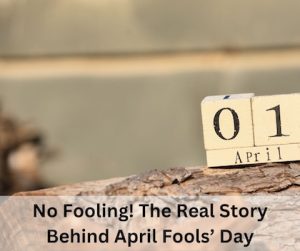No Fooling! The Real Story Behind April Fools’ Day
March 31, 2025Tuesday is April Fools’ Day but this story is no joke!
April Fools’ Day, celebrated every year on April 1st, is a day marked by pranks, jokes, and good-natured trickery. Although its exact origins remain uncertain, the tradition of playing harmless tricks on others has a long and varied history, crossing cultural and geographical boundaries.
Early Roots and Theories
One widely accepted theory about the origins of April Fools’ Day traces back to 16th-century France. In 1582, France switched from the Julian calendar to the Gregorian calendar, as called for by the Council of Trent. In the Julian calendar, the new year began with the spring equinox around April 1st. When the change was made, those who continued to celebrate the new year during the last week of March through April 1st were labeled as “April fools.” They became the target of pranks, including having paper fish stuck to their backs and being referred to as “poisson d’Avril” (April fish), symbolizing a gullible person.
Other historians link the day to ancient Roman and Celtic celebrations. The Romans celebrated a festival called “Hilaria” at the end of March, where people dressed in disguises and mocked fellow citizens. Similarly, some believe it has ties to the “renewal festivals” of ancient cultures, where social norms were turned upside down for a day.
April Fools’ Day Spreads
The tradition spread across Europe during the 18th century. In Scotland, it evolved into a two-day event, starting with “Hunt the Gowk Day,” where people were sent on foolish errands. The second day, known as “Tailie Day,” involved pinning fake tails or “kick me” signs on people.
In England, the tradition involved sending people on absurd errands, reminiscent of the old Scottish custom. As British settlers traveled, they took the tradition with them, leading to the observance of April Fools’ Day in the American colonies and beyond.
Modern-Day Shenanigans
Today, April Fools’ Day is a global phenomenon, with media outlets, companies, and individuals pulling elaborate pranks. From fake news stories to viral internet hoaxes, the day has evolved into a modern celebration of lighthearted deception. Some of the most memorable pranks have come from major brands, such as when Taco Bell announced they had purchased the Liberty Bell or when Google introduced outlandish fake products.
Though the day often brings laughter, it serves as a reminder that pranks should be harmless and in good spirits. As long as jokes are good-natured and don’t cross boundaries, April Fools’ Day continues to be a lighthearted way to welcome spring and share a laugh.


















